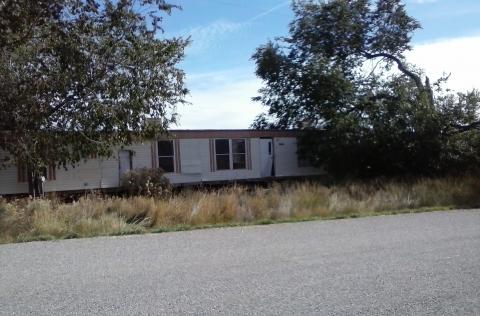

Box Elder County—Private property rights are in question in the tiny town of Howell. In this small farming community, some citizens are concerned by the infringement of personal property rights by the Howell Town Board. Of concern are several mobile homes that the town feels are “eyesores.” The town seeks to force the owners to have them removed from the property. This flies in the face of the fourth amendment that protects from unlawful searches and seizure of private property. What is also of concern is that it targets only mobile home owners— violating Utah’s Constitution, which states that all citizens must be treated equally under the eyes of the law.
At the September 13th Town council meeting, Howell resident and member of the planning commission, Dakota Tuck, brought up a concern with council members over the wording of an ordinance that requires owners of mobile homes to obtain a certificate of compliance from the County building inspector, or be subject to having to move the home from their private property. In an audio recording of the meeting, several council members can be heard discussing the ordinance, and one of them stated that they just "wanna get rid of the bad ones," and continued by stating that "a lot of people are offended" by a particular trailer on private property. In fact the ordinance itself is worded in a way that treats mobile home owners as second class citizens, subjecting those rules and regulations that which typical homeowners are not subjected.
In a telephone interview on 10-13-14, Councilman Rex Nessen admitted that the council was discussing "having everybody come up with that" (certificate of compliance). He further stated that according to the ordinance, "if they are not in compliance, they will have to move it," though he changed direction later when asked if the inspection process needed to enforce the ordinance complied with the Fourth Amendment to the U. S. Constitution. Councilman Nessen explained that the council had no intention of enforcing the ordinance, but could not explain why it was still in existence other than to say he was "new" to the council. When asked who would be enforcing the ordinance, he suggested Steve Bench, the Box Elder County Building Inspector was tasked with that responsibility. Councilman Nessen also stated that people "seem to think cities can't come up with laws that go against this Fourth Amendment thing."
At the October 14 Howell council meeting, Box Elder County Building Inspector, Steve Bench, responded to some of the concerns. Mr. Bench clarified that there was a legal difference between "mobile home" (built pre-1976), and "manufactured home" (built post-1976), and advised that clarifying that difference in the ordinance might ease some of the confusion. Additionally, he explained that by State law, anywhere that someone is allowed to put a single family dwelling, a municipality must also allow manufactured homes. However, municipalities are legally able to limit manufactured homes to doubles and triples only, as well as setting an age limitation (currently 15 years in Howell), if they choose.
Mr. Bench also explained that the Howell ordinance is very similar to the Box Elder County ordinance for manufactured and mobile homes. Regarding enforcement, however, he expressed a necessity in being overly cautious in the enforcement of these ordinances, which provide for his inspection when the structures are considered "dangerous." Councilman Byron Tuck asked if there was a vetting system in deciding what "dangerous" means. Mr. Bench explained that if his office only receives a single complaint about a particular building, he will go to the property, but "if it looks reasonable, I'm not going to inspect." When Mayor Craig Hawkes asked if he could inspect a house that had been ""abandoned," Mr. Bench stated, "If the town wants to abate the structure, and get attorneys involved, it can be done," and later added that "abatement is not for the city to get rid of it." Further, regarding the Town's interest in the Building Inspector requesting a certificate of compliance on a home sitting "unoccupied for some time," Mr. Bench stated, "I've never done that, and wouldn't feel comfortable with it." He suggested that a better route would be to ask the owner with an official letter what the plan with the structure is, prior to pursuing abatement, or enforcement.
There seemed to be a divide amongst council members as to what their role, if any, was in enforcing issues like this on private property. Although the council brought up fire hazard and vermin concerns as a driving force of the necessity to enforce the ordinance, Councilman Tuck suggested that one trailer in particular was a point of concern, and had bales of hay stacked up around it and might not even garner the town's interest if it were completely obscured from vision with additional hay bales, to which several members of the council agreed. This point suggests that the concern over the homes in question is less of a safety and health concern, and more one of aesthetics.
Ultimately, when Mayor Hawkes asked if the council wanted to proceed with sending a letter to the owners, Councilman Tuck stated that he was not in favor of any action that was threatening in any way. The council refused to suggest the sending of a letter at this point, with Councilman Nessen saying, "We need to turn around and put this in the owner’s lap", as well as offering to go talk with owner before any action is taken. The council unanimously agreed to this.
Nationwide, we are seeing more and more examples of people pushing back against the encroachment of government acting "in their best interest," when that action violates the mandates laid out for government through the Constitution. For example take St. George where they are facing costly litigation for exactly what the Town of Howell is trying to do—treat mobile home owners differently and force them to comply with a different set of rules than traditional homeowners. While the question is mobile homeowners today, it could very well be your home next that government seeks to control or confiscate. Government overreach must be stopped, even in small town America.